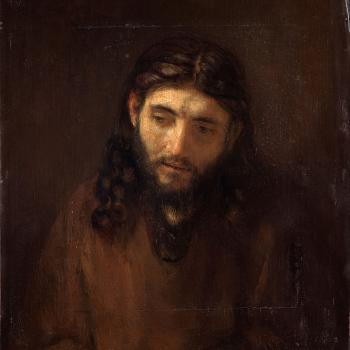I think the concern reflected in my title is based on a misunderstanding. When the Church has referred to Muslims worshiping the one God, it is meant in the sense of both Christians and Muslims being monotheists. Monotheism includes Christians, Jews, Muslims, and more vague “philosophical theists” (also cults like Jehovah’s Witnesses with their Arian God).Thus, Vatican II, Nostra Aetate, states:
They [Muslims] worship God, who is one, living and subsistent, merciful and almighty, the Creator of heaven and earth.
If you read closely, it isn’t saying that “the Muslim God [Allah] and the Christian God are exactly the same.” Not at all. Rather, the common bond is monotheism. Indeed, it could not possibly be equating Allah and Yahweh, because we believe God is a Trinity, and Muslims (and Jews) do not. Vatican II is using what might be called “diplomatic language” in its ecumenical statements. It’s an instance where the context of the statement is supremely important in determining the exact meaning intended.
Moreover, one must distinguish between the two notions:
1) A Muslim worshiping the One he believes to be the true God.
and
2) The recipient of God-directed worship, even if erroneous in some respects, being the God Who Really Is, since Allah does not exist.
As an analogy (the best I can think of at the moment), imagine a child who was adopted but didn’t yet know it. He or she might say, “I am really thankful that my mother gave me birth.” Now, this person thinks that his or her birth mother is the woman who in reality is only the adoptive mother. But nevertheless, the attitude of thankfulness for having been given birth in a sense “transfers” over to the real birth mother.
In other words, it has to be the birth mother who is truly receiving praise because the person giving it intends it for that person who gave him birth: and that person is who she is whether the child knows this or not. The fact that there is a mistake concerning the actual person regarded as the birth mother does not change the fact of it.
Likewise, a committed Muslim is worshiping what he sincerely believes to be God. He is mistaken, of course, as to the actual definition and ontological reality, but he is worshiping in common with Christians, insofar as he is also a monotheist. He is worshiping, for example, the Creator insofar as he understands Who the Creator is. And Yahweh is receiving that praise in reality because He is the true Creator. In that sense the Muslim is indeed worshiping God, but since Allah doesn’t exist, he is really (at bottom) worshiping Yahweh, in relative ignorance. And I believe that God (i.e., Yahweh!) takes this into account and the person gets some credit for what he does know and Who he wants to worship, even though he is mistaken in his theology.
The point is that words have to be read in context and in accordance with an overall worldview. As I have argued, no one seriously maintains that the Catholic Church has stopped believing in the Trinity. Therefore, when the Church says that Muslims and Jews worship the one God, it cannot possibly mean that “Muslims and Jews are trinitarian.” Therefore, it must mean that “Muslims and Jews are also monotheists, as we are, and worship the one God.” Context (and the writer’s purpose) are supremely important. Many people isolate texts and assume things wrongly, and that is where the problems arise.It sounds a lot better and is infinitely more positive in nature to say:
“Catholics and Muslims both worship the one God of Abraham,” etc.
than to say:
“We believe that Muslims worship a false God, because Allah isn’t trinitarian; therefore, He doesn’t exist at all, so that Muslims worship a figment of their imagination; the only true God is the trinitarian Yahweh of the Bible.”
That would rather defeat the ecumenical, diplomatic purpose, wouldn’t it? And that purpose is precisely to find things in common, which monotheism is. I happen to think there is a great deal of value in ecumenism. The language is necessarily different, because the purpose and goals are different. It is finding common ground rather than squabbling over differences.
Ecumenism and apologetics don’t clash at all. They are simply different, like apples and orange and vanilla and chocolate ice cream. We don’t say that those contradict each other.
It is good to defend what one believes to be the truth (I’ve devoted my life and profession to that), and also to build bridges and rejoice in common ground. The Catholic Church urges both and thinks both are good and worthwhile endeavors.
I can debate a Muslim and also speak this more ecumenical language in other contexts. Any Catholic ought to do the same, per the instruction of Vatican II and the tone and tenor of ecumenical papal encyclicals. It is the Mind of the Church. It is also quite “biblical”.
I don’t claim to be an expert on this conciliar text. Mainly I was trying to answer traditionalists and radical Catholic reactionaries who are convinced that Vatican II was compromising all over the place and making Allah the same as Yahweh. That’s not true.
It’s the same mentality (at least some manifestations of it) that condemned Pope St. John Paul II for kissing a Koran, thinking that in doing so he was wiping out all distinctions and virtually becoming a Muslim: which is ridiculous.
The totality of the Christian and Muslim conceptions of God are obviously not identical. Thus, when I said that “Allah doesn’t exist” I meant it in that specific sense. Insofar as Allah is different from Yahweh, it is a nonexistent Being, and the One Whom Muslims worship is actually Yahweh, as I argued.
*
By analogy, I could use the example of various anti-Catholic Protestants, who have made themselves my bitter enemies. They “know” me in some sense, and it really is me (this person sitting here typing this!). But they have a lot of mistaken ideas about me: what I supposedly am like, my interior dispositions, my motivations, my personality, how “angry” I supposedly get (I don’t) when answering their nonsense, or false theological views, whether I am a Christian and regenerate or not (they say no, which is a falsehood). When they say “Dave Armstrong” they are both referring to me as a definite object, but with vastly different beliefs about and impressions of me. But it’s the same person. I remain who and what I am, despite their false perceptions (or wishful thinking or whatever). Their errors are the analogy to Muslims and the True God: Yahweh.
*














